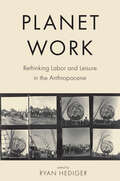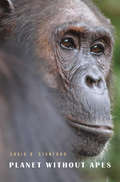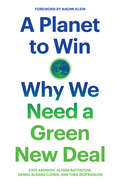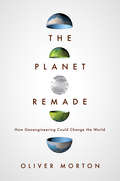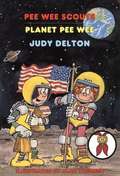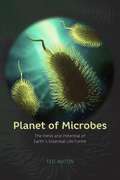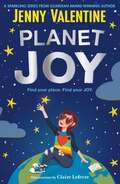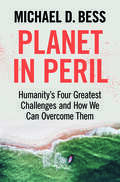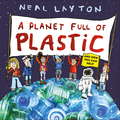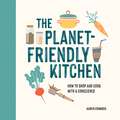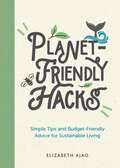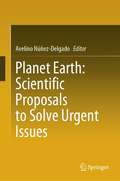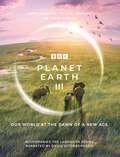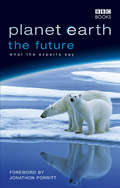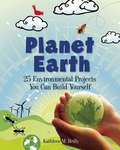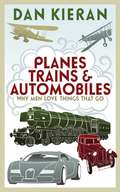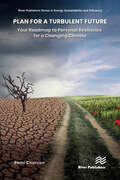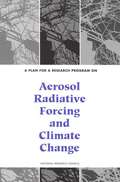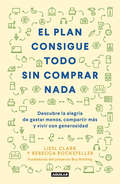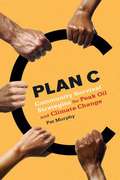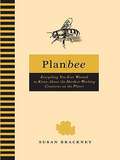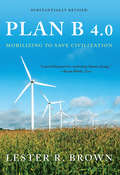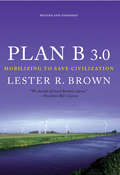- Table View
- List View
Planet Work: Rethinking Labor and Leisure in the Anthropocene
by Ryan Hediger David Rodland Ted Geier Sinan Akilli Daniel Clausen James Armstrong Matt Wanat Amanda Adams Jennifer K. Ladino Will Elliot Kevin Maier Jo Rey Sharon O'DairLabor and labor norms orient much of contemporary life, organizing our days and years and driving planetary environmental change. Yet, labor, as a foundational set of values and practices, has not been sufficiently interrogated in the context of the environmental humanities for its profound role in climate change and other crises. This collection of essays demonstrates the urgent need to rethink models and customs of labor and leisure in the Anthropocene. Recognizing the grave traumas and hazards plaguing planet Earth, contributors expose fundamental flaws in ideas of work and search for ways to redirect cultures toward more sustainable modes of life. These essays evaluate Anthropocene frames of interpretation, dramatize problems and potentials in regimes of labor, and explore leisure practices such as walking and storytelling as modes of recasting life, while a coda advocates reviving notions of work as craft.
Planet Without Apes
by Craig B. StanfordPlanet Without Apes demands that we consider whether we can live with the consequences of wiping our closest relatives off the face of the Earth. Leading primatologist Craig Stanford warns that extinction of the great apes—chimpanzees, bonobos, gorillas, and orangutans—threatens to become a reality within just a few human generations. We are on the verge of losing the last links to our evolutionary past, and to all the biological knowledge about ourselves that would die along with them. The crisis we face is tantamount to standing aside while our last extended family members vanish from the planet. Stanford sees great apes as not only intelligent but also possessed of a culture: both toolmakers and social beings capable of passing cultural knowledge down through generations. Compelled by his field research to take up the cause of conservation, he is unequivocal about where responsibility for extinction of these species lies. Our extermination campaign against the great apes has been as brutal as the genocide we have long practiced on one another. Stanford shows how complicity is shared by people far removed from apes’ shrinking habitats. We learn about extinction’s complex links with cell phones, European meat eaters, and ecotourism, along with the effects of Ebola virus, poverty, and political instability. Even the most environmentally concerned observers are unaware of many specific threats faced by great apes. Stanford fills us in, and then tells us how we can redirect the course of an otherwise bleak future.
A Planet to Win: Why We Need a Green New Deal (Jacobin)
by Kate Aronoff Alyssa Battistoni Daniel Aldana Cohen Thea RiofrancosIn the twenty-first century, all politics are climate politics.The age of climate gradualism is over, as unprecedented disasters are exacerbated by inequalities of race and class. We need profound, radical change. A Green New Deal can tackle the climate emergency and rampant inequality at the same time. Cutting carbon emissions while winning immediate gains for the many is the only way to build a movement strong enough to defeat big oil, big business, and the super-rich—starting right now.A Planet to Win explores the political potential and concrete first steps of a Green New Deal. It calls for dismantling the fossil fuel industry and building beautiful landscapes of renewable energy, guaranteeing climate-friendly work and no-carbon housing and free public transit. And it shows how a Green New Deal in the United States can strengthen climate justice movements worldwide. We don&’t make politics under conditions of our own choosing, and no one would choose this crisis. But crises also present opportunities. We stand on the brink of disaster—but also at the cusp of wondrous, transformative change.
The Planet Remade
by Oliver MortonThe risks of global warming are pressing and potentially vast. The difficulty of doing without fossil fuels is daunting, possibly even insurmountable. So there is an urgent need to rethink our responses to the crisis. To meet that need, a small but increasingly influential group of scientists is exploring proposals for planned human intervention in the climate system: a stratospheric veil against the sun, the cultivation of photosynthetic plankton, fleets of unmanned ships seeding the clouds. These are the technologies of geoengineering--and as Oliver Morton argues in this visionary book, it would be as irresponsible to ignore them as it would be foolish to see them as a simple solution to the problem. The Planet Remade explores the history, politics, and cutting-edge science of geoengineering. Morton weighs both the promise and perils of these controversial strategies and puts them in the broadest possible context. The past century's changes to the planet--to the clouds and the soils, to the winds and the seas, to the great cycles of nitrogen and carbon--have been far more profound than most of us realize. Appreciating those changes clarifies not just the scale of what needs to be done about global warming, but also our relationship to nature. Climate change is not just one of the twenty-first century's defining political challenges. Morton untangles the implications of our failure to meet the challenge of climate change and reintroduces the hope that we might. He addresses the deep fear that comes with seeing humans as a force of nature, and asks what it might mean--and what it might require of us--to try and use that force for good.
Planet Pee Wee (Pee Wee Scouts #34)
by Judy DeltonEveryone in the Pee Wee Scouts wants to win a trip to Camp Blast Off, the super-cool summer camp where kids learn what it's like to be an astronaut. But there's only room for one scout from each troop in the country. So the Pee Wee Scouts set out to make the best project about the planets and the solar system: Roger is building model meteors and stars with light bulbs, Rachel is stirring up a recipe for freeze-dried peanut butter. Find out what Molly and Mary Beth are working on--maybe the most exciting project of all! The Pee Wees goof around, do good deeds, take on projects and have fun and adventures. Find out all about what scouts do in the other 38 Pee Wee Scout books you can get from Bookshare including: #1 Cookies and Crutches, #2 Camp Ghost-Away, #3 Lucky Dog Days, #4 Blue Skies, French Fries, #5 Grumpy Pumpkins, #6 Peanut-Butter Pilgrims, #7 A Pee Wee Christmas, #8 That Mushy Stuff, #9 Spring Sprouts, #10 The Pooped Troop, # 11 The Pee Wee Jubilee, #12 Bad, Bad, Bunnies, #13 Rosy Noses, Frozen Toes, #14 Sonny's Secret, #15 Sky Babies, #16 Trash Bash, # 17 Pee Wees On Parade, #18 Lights, Action, Land-ho!, # 19 Piles of Pets, #20 Fishy Wishes, #21 Pee Wees On skis, #22 Greedy Groundhogs, #23 All Dads on Deck, #24 Tricks and Treats, #25 Pee Wees on First, # 26 Super Duper Pee Wees, #27 Teeny Weeny Zucchinis, #28 Eggs With Legs, #29 Pee Wee Pool Party, #30 Bookworm Buddies, #31 Moans and Groans and Dinosaur Bones, #32 Stage Frightened, #33 Halloween Helpers, #35 Pedal Power, #36 Computer Clues # 37 Wild, Wild West, #38 Here Come the Clowns, and #39 Molly For Mayor.
Planet of Microbes: The Perils and Potential of Earth's Essential Life Forms
by Ted AntonWe live in a time of unprecedented scientific knowledge about the origins of life on Earth. But if we want to grasp the big picture, we have to start small—very small. That’s because the real heroes of the story of life on Earth are microbes, the tiny living organisms we cannot see with the naked eye. Microbes were Earth’s first lifeforms, early anaerobic inhabitants that created the air we breathe. Today they live, invisible and seemingly invincible, in every corner of the planet, from Yellowstone’s scalding hot springs to Antarctic mountaintops to inside our very bodies—more than a hundred trillion of them. Don’t be alarmed though: many microbes are allies in achieving our—to say nothing of our planet’s—health. In Planet of Microbes, Ted Anton takes readers through the most recent discoveries about microbes, revealing their unexpected potential to reshape the future of the planet. For years, we knew little about these invisible invaders, considering them as little more than our enemies in our fight against infectious disease. But the more we learn about microbes, the more it’s become clear that our very lives depend on them. They may also hold the answers to some of science’s most pressing problems, including how to combat a warming planet, clean up the environment, and help the body fight off a wide variety of diseases. Anton has spent years interviewing and working with the determined scientists who hope to harness the work of microbes, and he breaks down the science while also sharing incredible behind-the-scenes stories of the research taking place everywhere from microbreweries to Mars. The world’s tiniest organisms were here more than three billion years before us. We live in their world, and Planet of Microbes at last gives these unsung heroes the recognition they deserve.
Planet Ocean
by Jan Dutkiewicz Paul WatsonVeteran environmental activist and Whale Wars host Paul Watson offers in this interview a provocative and revolutionary view of the state of an environment in crisis. The planet may survive our environmental destruction, he argues, but humans may not. Focused on protecting oceans, preventing the loss of biodiversity, and promoting individual action, Watson's singular call to arms challenges the typical talking points of the modern environmental movement.
Planet Joy
by Jenny ValentineFor readers aged 9+ comes the third book in a sparkling series about family, friends and finding the joy in life! From Guardian award-winning author Jenny Valentine, this is the perfect series for fans of Jacqueline Wilson, Cath Howe and Lara Williamson! Meet ten-year-old Joy Applebloom, a girl with a knack for finding the silver lining in even the darkest of rainclouds. After years of travelling the world with her family, Joy feels like she&’s finally found a place she can call home. She&’s settled in at school, has a new best friend called Benny and she&’s finally making a difference in the world. But when a new girl, Phoebe Dark, joins class 6C, Joy discovers there&’s a whole world out there that she hasn&’t explored yet . . . Could Plane Tree Gardens be just the beginning?A heart-warming and joyful series about family, friends and never being too small to make a difference, with gorgeous illustrations from Claire Lefevre. 'A delight for its warmth and humour, but principally because the writing is alive and stunning' The Sunday Times on A Girl Called Joy
Planet in Peril Planetary Dangers: Humanity's Four Greatest Challenges and How We Can Overcome Them
by Michael D. BessWritten by an award-winning historian of science and technology, Planet in Peril describes the top four mega-dangers facing humankind – climate change, nukes, pandemics, and artificial intelligence. It outlines the solutions that have been tried, and analyzes why they have thus far fallen short. These four existential dangers present a special kind of challenge that urgently requires planet-level responses, yet today's international institutions have so far failed to meet this need. The book lays out a realistic pathway for gradually modifying the United Nations over the coming century so that it can become more effective at coordinating global solutions to humanity's problems. Neither optimistic nor pessimistic, but pragmatic and constructive, the book explores how to move past ideological polarization and global political fragmentation. Unafraid to take intellectual risks, Planet in Peril sketches a plausible roadmap toward a safer, more democratic future for us all.
A Planet Full of Plastic: and how you can help
by Neal LaytonEverything is made of stuff. Some things are made of paper, like this book. And some things are made of PLASTIC. If you look around you, plastic is everywhere. Even in places where it's not meant to be. If it drops to the ground, it doesn't rot away - it sticks around for ever.Our world is drowning in plastic, and it's a big problem. Award-winning author-illustrator Neal Layton is here to explain where plastic comes from, why it doesn't biodegrade, and why that's dangerous for animals and humans alike. But he's also FULL of ideas for how you can help! From giving up straws in juice cartons to recycling all we can and taking part in a beach clean, A Planet Full of Plastic will get young readers excited about how they can make a difference to keep Planet Earth happy.This brilliant non-fiction picture book, illustrated in Neal's trademark collage style, is perfect for readers aged 5-7 who love nature and want to help the environment.
The Planet-Friendly Kitchen: How to Shop and Cook With a Conscience
by Karen EdwardsWe all have the power to make a differenceWe know our planet’s resources are stretched to the limits. We know that without significant changes to our diets and shopping habits, nature will continue to suffer. But sometimes it feels like we’re bombarded with mixed messages, and it can be hard to work out which foods are truly eco-friendly. This book sets out the facts in a clear and straightforward way, helping you to make informed choices about environmentally conscious ways to shop, the products to avoid, the best foods to buy, and sustainable ways to prepare them.With over 30 delicious recipes that you, and the earth, will love, The Planet-Friendly Kitchen contains all the tips and advice you need to start making small changes that have big impacts. The choices we make can help create a kinder way of feeding the world, and will preserve our beautiful planet for many generations to come.
The Planet-Friendly Kitchen: How to Shop and Cook With a Conscience
by Karen EdwardsWe all have the power to make a differenceWe know our planet’s resources are stretched to the limits. We know that without significant changes to our diets and shopping habits, nature will continue to suffer. But sometimes it feels like we’re bombarded with mixed messages, and it can be hard to work out which foods are truly eco-friendly. This book sets out the facts in a clear and straightforward way, helping you to make informed choices about environmentally conscious ways to shop, the products to avoid, the best foods to buy, and sustainable ways to prepare them.With over 30 delicious recipes that you, and the earth, will love, The Planet-Friendly Kitchen contains all the tips and advice you need to start making small changes that have big impacts. The choices we make can help create a kinder way of feeding the world, and will preserve our beautiful planet for many generations to come.
Planet-Friendly Hacks: Simple Tips and Budget-Friendly Advice for Sustainable Living
by Elizabeth AjaoThis handy guide is brimming with quick tips, life hacks and budget-friendly tricks to help you reduce your carbon footprint and live more sustainablyAn eco-friendly lifestyle is expensive and time-consuming, right? Wrong! There are countless ways to make green choices that don’t take a toll on your time, your bank balance or the planet.This book is your one-stop guide to living a more sustainable lifestyle. Whether you need tips on conserving energy or reducing food waste, or you want to give your home a makeover without impacting the planet, these pages include everything you need to get started. You will find:Clever life hacks to make reducing your carbon footprint that bit easierSimple tips to help you make planet-friendly choices in everyday lifeSmart advice for eco-living on a budgetInspiration for eco-friendly crafts and DIY projectsIt’s more important than ever to do our bit for the environment, and Planet-Friendly Hacks will help you live life to the full without costing the earth.
Planet Earth: Scientific Proposals to Solve Urgent Issues
by Avelino Núñez-DelgadoThis book represents the most comprehensive overview of issues affecting our planet and the forefront solutions, including climate change, air, water, soil pollution, demography, and access to food and water. This edited book, led by Prof. Núñez-Delgado, counts with the participation of leading researchers across a wide range of disciplines to be an inspiring and motivating document to promote sustainability and biodiversity. Those of you asking for trustworthy analyses about sustainability and climate change and the vanguard solutions will find this book fascinating.
Planet Earth III: Accompanies the Landmark Series Narrated by David Attenborough
by Matt Brandon Michael Gunton Jonny KeelingThe official tie-in to the third instalment in the legendary Planet Earth franchiseFew places on Earth remain untouched by humans, creating challenges for the wildlife we share it with. We have entered a new age, and we must look at the splendour of the natural world through a different lens.From the depths of our oceans, to scorching deserts and the most remote jungles, Planet Earth III features spectacular places and surprising animal behaviours from all corners of our world. And for the first time, a human element is introduced to each landscape, highlighting how, in the age of the Anthropocene, today's planet has been forever changed by humanity and that wildlife now faces new challenges in our crowded, modern world.Featuring over 250 beautiful full-colour photographs, Planet Earth III reveals the wonders and trials of life on an increasingly fragile planet, bringing you closer than ever before to our world’s most intriguing species, unseen landscapes and natural phenomena.
Planet Earth, The Future
by Fergus Beeley Jonathan Porritt Rosamund Kidman CoxPlanet Earth is the most spectacular look at our planet that has ever been broadcast. It has made millions of viewers aware of the breathtaking beauty and variety of life on our planet, and just as importantly how fragile that life can be. The premise of Planet Earth - The Future is to identify environmental and conservation issues that surround some of the sequences in Planet Earth, and put these issues to leading commentators, including NGO's, politicians and religious leaders James Leape (WWF International), Jeffrey McNeely (World Conservation Union), and the Archbishop of Canterbury to name but a few of the 35 contributors. We are living in destructive times, and our responsibility for the planet's stewardship is something none of us can afford to ignore. Comprised of transcripts from the series interviews, thoughtfully edited and abbreviated, this compelling and insightful book serves as a timely reminder of what needs to be done and what can be done to keep Planet Earth alive.
Planet Earth
by Farah Rizvi Kathleen M. ReillyPlanet Earth: 25 Environmental Projects You Can Build Yourself provides an engaging guide to the natural world and encourages children ages 9 and up to get their hands dirty and actively connect with the environment. It then introduces key environmental issues-wind and solar power, pollution, endangered species, global warming, and recycling-and posits potential solutions. Trivia, fun facts, and 25 captivating hands-on projects investigate ecology basics, such as the food chain, oxygen, and animal habitats, as well as ways to lessen the strain on Earth's resources by reducing human consumption and waste. With Planet Earth kids will learn how to respect and protect our unique planet.
Planes, Trains and Automobiles: Why Men Like Things that Go
by Dan KieranWhat is it about an engine roaring into life that makes grown men go weak at the knees? This is a book about machines and the men who love them. Some of these men are quite odd. Having always been a mechanaphobe himself, living in the slow lane, Dan Kieran is on a mission to discover the allure of machines and man's need for speed. Follow Dan as he climbs aboard a penny-farthing for a jaunt around west London, drives a steam train through the 'alps', joins the pit lane crew of Mitsubishi for the Britcar 24-hour race at Silverstone, discovers the link between Lawrence of Arabia and the 'wall of death', meets tank (yes, tank) collectors and the men behind 'digger ballet', learns to fly in the shadow of Douglas Bader and, along the way, wrestles with Aristotle, Jeremy Clarkson, Plato, Hunter S. Thompson and, mostly, himself.Join Dan as he makes a journey of discovery into another world, the happy and quirky world of the Great British potterer and machine enthusiast. Could he even be tempted to stay there?
Plan for a Turbulent Future: Your Roadmap to Personal Resilience for a Changing Climate
by Remi CharronMillions of lives and businesses have either been lost or significantly impacted by COVID-19. Yet, many are warning that climate change will be much more devastating over the coming decades. Reality is starting to set in. We are not going to achieve our global mitigation targets; we probably won’t even come close. Individuals faced with this reality react differently, from willful ignorance to anxiety and depression, all normal reactions. If you believe in science and understand the likelihood of our failure to meet our targets, you need to accept and plan for an unknown, challenging future. We may be individually powerless to stop climate change, but we certainly can act in ways that will help us better face the consequences. This book provides a structured approach to plan and prepare today for a world rocked by a turbulent climate.
A Plan for a Research Program on Aerosol Radiative Forcing and Climate Change
by National Research Council StaffThis book recommends the initiation of an "integrated" research program to study the role of aerosols in the predicted global climate change. Current understanding suggest that, even now, aerosols, primarily from anthropogenic sources, may be reducing the rate of warming caused by greenhouse gas emissions. In addition to specific research recommendations, this book forcefully argues for two kinds of research program integration: integration of the individual laboratory, field, and theoretical research activities and an integrated management structure that involves all of the concerned federal agencies.
El plan consigue todo sin comprar nada: Descubre la alegría de gastar menos, compartir más y vivir con generosidad
by Liesl ClarkDescubre la verdadera libertad y felicidad que viene de comprar menos y compartir más. En 2013, las amigas Liesl Clark y Rebecca Rockefeller se dieron cuenta de la cantidad de residuos que había en sus playas locales -desde plumas y popotes hasta juguetes y cepillos de dientes- y decidieron hacer algo al respecto. Así nació el proyecto Buy Nothing. Lo que comenzó como un grupo experimental e hiperlocal de vecinos que compartían y juntaban recursos, se convirtió en un movimiento social viral de más de un millón de miembros. Inspirado en las economías de regalo tradicionales, este libro revela una nueva y liberadora forma de vida. Su programa de siete pasos con conciencia medioambiental te ayudará a convertir tu desorden en un tesoro, a pasar menos tiempo comprando y más tiempo conectando y a dejar de lado la necesidad de comprar cosas nuevas. Lleno de listas útiles, como 50 artículos que nunca necesitas comprar (bolsas herméticas y toallas de papel) o 50 cosas para hacer (limpiadores domésticos y aderezos para ensaladas), El plan consigue todo sin comprar nada te anima a repensar las compras y a adoptar una mentalidad de ahorro de espacio, dinero y tiempo.
Plan C: Community Survival Strategies for Peak Oil and Climate Change
by Pat MurphyLibrary Journal This book goes further than any of the other titles considered here, both in terms of the deep societal ills it examines and the radical solutions it proposes. It is not just peak oil, but peak America Murphy takes as his subject. <P><P>His plan is based on "curtailment" - we must not only make drastic cuts in our use of fossil fuels, but also cut our rates of consumption, buy less, use less, want less, waste less, watch less televsion, eat better foods, give up driving private cars, and become, in short, "a nation with new values." Murphy's work is perhaps easy to dismiss - i.e. fringe, hairshirted- but if, as the best scientific evidence suggests, the world is already in a dangerous state of overshoot, then its message may not be that far out after all. Reviewed by Robert Eagan Canadian Moneysaver Plan C is an indispensable resource for anyone interested in living a lower energy, saner, more sustainable lifestyle. If you accept the plethora of research supporting energy depletion (oil, gas and coal) and climate change globally, you must read this book. Written without big business or a political bias, this objective author provides the framework for future development. Shrewd investors beware. Reviewed by Dale Ennis Concerns over climate change and energy depletion are increasing exponentially. Mainstream solutions still assume a panacea that will cure our climate ills without requiring any serious modification to our way of life. Plan C explores the risks inherent in trying to continue our energy-intensive lifestyle. Using dirtier fossil fuels (Plan A) or switching to renewable energy sources (Plan B) allows people to remain complacent in the face of potential global catastrophe. Dramatic lifestyle change is the only way to begin to create a sustainable, equitable world. The converging crises of Peak Oil, climate change, and increasing inequity are presented in a clear, concise manner, as are the twin solutions of community (where cooperation replaces competition) and curtailment (deliberately reducing consumption of consumer goods). Plan C shows how each person's individual choices can dramatically reduce CO2 emissions. It offers specific strategies in the areas of food, transportation, and housing. One chapter analyzes the decimation of the Cuban economy when the USSR stopped oil exports in 1990 and provides an inspiring vision for a low-energy way of living. Plan C is an indispensable resource for anyone interested in living a lower-energy, saner, and more sustainable lifestyle.
Plan Bee
by Susan BrackneyA guided tour inside the world of beesOvertaxed and underrecognized-and now disappearing in alarming numbers- bees are the unsung heroes of the food chain, essential for the pollination of more than ninety of the crops we eat. The hardworking, humble, and matriarchal bee finally gets her due in this engaging and expertly written guide that will appeal to anyone who's ever been curious about the mysterious and always-buzzing world of bees. Beekeeper Susan Brackney explains:* Why honeybees are disappearing-and what we can do about it* Who's who in the hive-the queen bee, the workers, and the drones* Bees by the numbers-the number of bees per hive, the number of wing beats per second, and other fascinating facts* Gardening tips to attract and support honeybees* The beekeeper's trade-the essential equipment and the latest tools, a day in the life, and more* Honey, pollen, wax, royal jelly, mead, and other products of the sweet life* The secrets behind making a bee beard (or bee bikini) with live bees. . . and much more
Plan B 4.0: Mobilizing to Save Civilization (Substantially Revised)
by Lester R. Brown"[Brown's] ability to make a complicated subject accessible to the general reader is remarkable."--Katherine Salant, Washington Post As fossil fuel prices rise, oil insecurity deepens, and concerns about climate change cast a shadow over the future of coal, a new energy economy is emerging. Wind, solar, and geothermal energy are replacing oil, coal, and natural gas, at a pace and on a scale we could not have imagined even a year ago. For the first time since the Industrial Revolution, we have begun investing in energy sources that can last forever. Plan B 4.0 explores both the nature of this transition to a new energy economy and how it will affect our daily lives.
Plan B 3.0: Mobilizing to Save Civilization (Substantially Revised)
by Lester R. Brown"How to build a more just world and save the planet....We should all heed Brown's advice."--Bill Clinton In this updated edition of the landmark Plan B, Lester Brown outlines a survival strategy for our early twenty-first-century civilization. The world faces many environmental trends of disruption and decline, including rising temperatures and spreading water shortage. In addition to these looming threats, we face the peaking of oil, annual population growth of 70 million, a widening global economic divide, and a growing list of failing states. The scale and complexity of issues facing our fast-forward world have no precedent With Plan A, business as usual, we have neglected these issues overly long. In Plan B 3.0, Lester R. Brown warns that the only effective response now is a World War II-type mobilization like that in the United States after the attack on Pearl Harbor.
